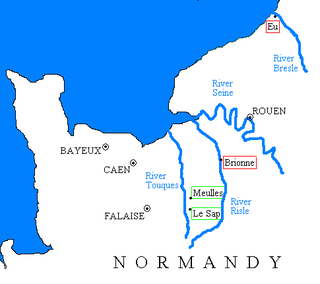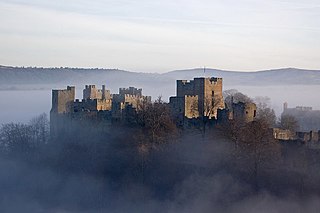Related Research Articles

Baldwin FitzGilbert was a Norman magnate and one of the 52 Devon Domesday Book tenants-in-chief of King William the Conqueror, of whom he held the largest fiefdom in Devon, comprising 176 holdings or manors. He was feudal baron of Okehampton, seated at Okehampton Castle in Devon.
Urse d'Abetot was a Norman who followed King William I to England, and became Sheriff of Worcestershire and a royal official under him and Kings William II and Henry I. He was a native of Normandy and moved to England shortly after the Norman Conquest of England in 1066, and was appointed sheriff in about 1069. Little is known of his family in Normandy, who were not prominent, but he probably got his name from the village Abetot. Although Urse's lord in Normandy was present at the Battle of Hastings, there is no evidence that Urse took part in the invasion of England in 1066.

Pain fitzJohn was an Anglo-Norman nobleman and administrator, one of King Henry I of England's "new men", who owed their positions and wealth to the king.
Roger de Valognes was an Anglo-Norman nobleman who held lands around Benington in Hertfordshire, a tenure that made Roger the feudal baron of Benington. In 1136 he was a supporter of King Stephen of England's seizure of the English throne from Matilda, the daughter of the previous king, Henry I. Roger built Benington Castle and gave lands to Binham Priory in the early part of Stephen's reign, but was dead by 1142. His barony passed to his first two sons in succession and his third son became a royal official in Scotland.
William de Chesney was a medieval Anglo-Norman nobleman and sheriff. The son of a landholder in Norfolk, William inherited after the death of his two elder brothers. He was the founder of Sibton Abbey, as well as a benefactor of other monasteries in England. In 1157, Chesney acquired the honour of Blythburgh, and was sheriff of Norfolk and Suffolk during the 1150s and 1160s. On Chesney's death in 1174, he left three unmarried daughters as his heirs.
Geoffrey Talbot was a medieval Anglo-Norman nobleman during the civil war of King Stephen of England's reign. His landholdings around Swanscombe are considered to possibly constitute a feudal barony. Although he was at Stephen's court in early 1136, by 1138 Talbot was supporting Stephen's rival, Matilda. After escaping capture twice, Talbot was captured by partisans of Stephen but was released. In 1139 and 1140, Talbot was engaged in military operations around Hereford, which included fortifying Hereford Cathedral in an attempt to take Hereford Castle.

Walter de Lacy was a Norman nobleman who went to England after the Norman Conquest of England in 1066. He received lands in Herefordshire and Shropshire, and served King William I of England by leading military forces during 1075. He died in 1085 and one son inherited his lands. Another son became an abbot.
Reginald de Warenne was an Anglo-Norman nobleman and royal official. The third son of an earl, Reginald began his career as an administrator of his brother's estates, and continued to manage them for his brother's successor, William, the second son of King Stephen. Reginald was involved in the process that led to the peaceful ascension of Henry fitzEmpress to the throne of England in 1154 and served the new king as a royal justice afterwards. He played a minor role in the Becket controversy in 1170, as a member of the party that met Becket on his return to England from exile in 1170.
Hugh de Cressy was an Anglo-Norman administrator and nobleman. Little is known of his ancestry and he first served two brothers of King Henry II of England before becoming a royal official. He was rewarded with a marriage to an heiress for his service to the king. In England he often served as a royal justice and witnessed documents, which showed his closeness to the king. On the continent, he recruited mercenaries for the royal army and was named constable of the castle of Rouen in the royal lands in France. He died in 1189 after giving lands to various monasteries before his death.
William Meschin was an Anglo-Norman nobleman and baron. The brother of the earl of Chester, Meschin participated in the First Crusade. After returning to England, he acquired lands both from King Henry I of England and by his marriage to an heiress.
Robert fitzRoger was an Anglo-Norman nobleman and Sheriff of Norfolk and Suffolk and Northumberland. He was a son of Roger fitzRichard and Adelisa de Vere. FitzRoger owed some of his early offices to William Longchamp, but continued in royal service even after the fall of Longchamp. His marriage to an heiress brought him more lands, which were extensive enough for him to be ranked as a baron. FitzRoger founded Langley Abbey in Norfolk in 1195.
William Paynel was an Anglo-Norman nobleman and baron. Son of a Domesday landholder, William inherited his father's lands in Yorkshire, Lincolnshire, and Normandy after the death of an older brother during their father's lifetime. After the death of King Henry I of England, Paynel supported Henry's daughter Matilda in her attempts to take the throne from her cousin Stephen, who had seized it. Matilda entrusted Nottingham Castle to Paynel's custody, although he lost it within two years when it was captured by a supporter of Stephen's. Paynel also founded two religious houses - one in England and one in Normandy. After Paynel's death around 1146, his lands were split between two sons.
Hasculf de Tany was an Anglo-Norman nobleman who lived in medieval England, in the region of London. He is believed to have been castellan of the Tower of London.
Geoffrey Talbot was an Anglo-Norman nobleman in medieval England. Holding lands around Swanscombe in Kent, he is often considered to have been the feudal baron of Swanscombe. Besides his lands, he was also given custody of Rochester Castle. His heir was his son, also named Geoffrey.
Rohese Giffard was a Norman noblewoman in the late 11th and early 12th century. The daughter of a Norman noble, she was the wife of another Norman noble, Richard fitzGilbert, who was one of the ten wealthiest landholders there after the Norman Conquest. Rohese is mentioned in Domesday Book as a landholder in her own right, something uncommon for women. She and Richard had a number of children, and she lived on past his death around 1086, until at least 1113 when she is recorded giving lands to a monastery. Her descendants eventually inherited her father's lands, although this did not occur until the reign of King Richard I of England.
Adam de Port was an Anglo-Norman nobleman and Baron of Kington.
Robert Blund was a Norman nobleman and Sheriff of Norfolk after the Norman Conquest of England.
Osbern fitzRichard was a Frenchman, perhaps Norman, who was a landowner and tenant-in-chief in England. Osbern served as a royal judge and sided with the baronial rebels at the start of King William II's reign, although he later returned to the king's service.
Hugh fitzBaldric was a Norman nobleman and royal official in England after the Norman Conquest of England.

The Domesday Book of 1086 AD lists King William the Conqueror's tenants-in-chief in Snotinghscire (Nottinghamshire), following the Norman Conquest of England:
References
- Keats-Rohan, K. S. B. (1999). Domesday People: A Prosopography of Persons Occurring in English Documents, 1066–1166: Domesday Book. Ipswich, UK: Boydell Press. ISBN 0-85115-722-X.
- Lewis, C. P. (2004). "Richard Scrob". Oxford Dictionary of National Biography. Retrieved 23 January 2020.(subscription or UK public library membership required)
- Sanders, I. J. (1960). English Baronies: A Study of Their Origin and Descent 1086–1327. Oxford, UK: Clarendon Press. OCLC 931660.